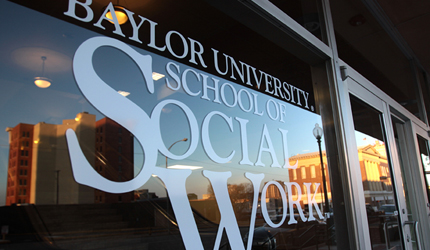By Ashley Yeaman
Reporter
Baylor students from all academic disciplines can now minor in poverty studies and social justice, a program housed in the School of Social Work.
It took time to launch the new minor because of its interdisciplinary nature, said Dr. Jon Singletary, associate dean for baccalaureate studies, the Diana R. Garland Endowed Chair in Child and Family Studies and the director of the Center for Family and Community Ministries.
“We wanted to have different departments who are on campus involved, and so we wanted everybody to have a chance for some input, and also just be able to get all the approvals that are necessary [for an interdisciplinary program],” Singletary said. “But it’s finally approved, and we are definitely excited.”
The minor is part of the academic foundation and focus of the Baylor Interdisciplinary Poverty Initiative, an organization designed to “create a catalyst for social change around issues of poverty, social justice and human capability,” according to its website.
Dr. Gaynor Yancey, professor of social work, said that even prior to the creation of the initiative, it had been determined that a minor should be created.
“We knew there were all sorts of instructors who were integrating social justice issues and poverty issues into their courses,” Yancey said. “There was a reason for the minor because it gave an emphasis, especially interdisciplinary [in scope], to these issues of poverty and social justice.”
The minor is structured with flexibility in mind in order for students to use classes from many departments.
“Half of the hours for the minor are a required core set of classes. Two of those are in social work, and one is in economics,” Singletary said. “But then the other nine hours of the minor can be taken from different departments. We have 25 or 30 pre-approved classes, but if students identify other courses that are related to poverty, they can include those pretty easily.”
In order to appeal to a wider group of students, especially outside of the School of Social Work, Singletary said they tried to create a new course listing prefix, but this attempt failed.
“We wanted to create a poverty prefix so the courses wouldn’t be social work or engineering, they would be poverty classes, but the university wouldn’t do that,” Singletary said.
This has not deterred interest in the program, however, Yancey said.
“We already have seen some [interested] out of philosophy. We have some from religion,” Yancey said. “It’s not contingent on any one group.”
2010 alumna Katie Yocham, who now works as a grassroots organizer at the Texas Hunger Initiative said she took enough classes to have earned this minor had it been offered at the time.
“My perspective on poverty at that point was from my personal experiences,” Yocham said. “This was the first time that I really had more of an educational background in it.”
Yocham said the interdisciplinary nature of the classes was beneficial, giving her an education to go with her personal experiences.
“You don’t look at poverty just from one angle. You really get to go at it from all different perspectives,” Yocham said. “You also get to look at specifics and focus on a certain issue of poverty if you want. It gives you a pretty good general picture of what’s going on around poverty in all different areas.”
Yocham said having this educational base has helped in her work at the Texas Hunger Initiative.
“Something as vast, complicated and complex as poverty takes a lot of learning and a lot of trial and error [in the workplace],” Yocham said. “You have to know what you’re talking about. You can’t just pull from personal experiences that you’ve had to convince people of something. Not only has [the education] affected how I am working with these people in this organization, but it’s also encouraged me to continue to work in areas of poverty.”
For those who do not want to pursue careers in issues of poverty and social justice, Singletary said the program can provide a deeper awareness of these issues.
“After Steppin’ Out, or the summer mission projects, students are always saying, ‘Well, we got to work with poor people, but how do we really change the system?’ And I think that’s a part that motivated us to [create the minor] — wanting to educate students to be able to change systems to address poverty.”
Singletary said the minor brings together faculty and students to study the issues surrounding poverty in a more immersive way.
“There had been a couple of research projects where students had been able to work together on different areas of poverty,” Singletary said. “You know, students could always take one or two classes that would address these issues, but to have a whole curriculum where students could work together across majors [has been] something that we’ve been dreaming of for several years.”
For a detailed look at the poverty studies and social justice minor, students can visit www.baylor.edu/student_life.






